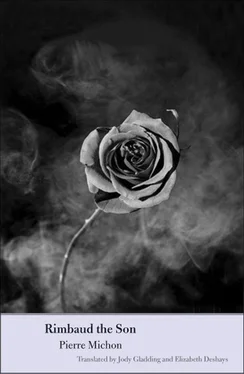It is said that they killed one another in that way because their characters were ideally opposite, like the sun and the moon; because one had the brilliance of the day, the ardor of the day, strength and the seven-league boots, while the other’s aspiration was to barely glisten, to appear between branches, to set, to flee; because one fomented la poésie moderne while the other made do with old-fashionedness, that is to say, made use of that very old and effective mix of sentiment and end rhyme that, strangely enough, we customarily forgive Malherbe, Villon, and Baudelaire for using, but not Verlaine; also because Verlaine, indecisive and divided like the moon, did not give himself with his whole soul, was not entirely in London and had left a part of himself in Paris, from where the little wife sent letters and pressed as persuasively as Eve upon the E string. These characters are too strongly contrasting not to be false; we have retouched them at our poets’ desks.
It is also said — to explain the herrings and the six-shooter — that they were consumed by the derangement of all the senses , to which they both earnestly applied themselves, because surreptitiously they both wore the red waistcoat; they applied themselves to it; they did not become seers and pursued clairvoyance in pure drunkenness, which so much resembles it: and we can well believe that ten months of shared bingeing turned two impetuous young men into the convulsionaries of Brussels, on the day when from the cauldron of stouts the muzzle of the six-shooter emerged like a flower. I do not believe in the nightingale argument according to which Rimbaud, aware of his genius, as we say under our silk skullcaps, scorned Verlaine, Verlaine’s poetry, and accused him of being without genius; because Verlaine had genius; and Rimbaud, ravaged and incurable as he was, was modern with less absolutism than we are. But I do believe, as I have said, that in confronting one another, their respective E strings wore each other out; for both of them their little string, the Orphic E string, the string of poetic destiny without parallel, without measure, which Baudelaire had taught them both to play and which so easily gets stuck; upon which they pressed down hard; upon which you must play for yourself, convince yourself, and you cannot do so for long if another E string is squeaking next to you: for the simple reason that in a single room in Camden Town it is not possible for both to be verse in person at the same time. That cannot be shared between living beings, one of the two E strings must break.
And Rimbaud pressed harder.
Rimbaud played with greater care. He wanted to be poetry in person more strongly than Verlaine did, to the exclusion of anyone else: because that was the only condition by which he could hope to appease the old woman in the inner well, to allow her a bit of a rest, the dark fingers finally relaxed, the hand open, no more tampering, just the tenderness of sleeping flesh. In order to be consoled, to sleep, the old woman within needed the son to be the best, which is to say the only, and free of any master. Of that I am sure: Rimbaud refused and execrated all masters, and not so much because he wanted or thought himself to be one but because his own master, that is, Carabosse’s, the Captain, distant as the tsar, inconceivable as God, like them all the more sovereign for being locked away behind kremlins, behind clouds, his master had always been an ineffable phantom figure exhaled in the phantom bugles of distant garrisons, a perfect figure, beyond reach, infallible and mute, postulated, whose Realm was not of this world; and seeing the apparition of him in this world, not even the apparition but the suspicion, the appearance, the shadow, the lieutenant, the fallen incarnation that downed stouts into his beard and wrote beautiful verses, drove Rimbaud out of his mind, dispossessed him, and no doubt he was infuriated, at the height of indignation without knowing why, like a Pharisee whom the opaque God of the Law insults by appearing clearly as the filthy Nazarene. Verlaine wiped the stout from his beard and gazed, smiling, at this grown boy whom he loved; Rimbaud, indignant, spat on the ground, turned on his heel, and slammed the door. This refusal of a visible master, in Rimbaud’s case, is called rebellion, juvenile rebellion, but it is very old, like the old serpent in the old apple tree, like the language we speak. It is in the language that says I when it passes over the heads of visible creatures and deigns only to address God. And the unfortunate Verlaine, superlative creature, who was only too visible with his beard and his jokes, who was twenty-seven years old, an established poet, recognized by the established poets, who knew the Old Man of the red waistcoat and kept in his possession letters from him, who had handled grand rhetoric for longer than a boy of eighteen, Verlaine, despite himself, could only appear the elder, royal despite his crooked crown, half-master: and he had to be brought down, for Rimbaud to be completely Rimbaud, the verse, necessarily imperfect because it served others, had to be broken, prose without measure had to be played with the greatest care on the little string, and one had to go off to die in the nothingness of the Horn of Africa, among tribes without violins, where one has no masters other than the desert, thirst, Fate, sovereigns all barely visible, buried in sand like the sphinxes, but sovereigns, captains, murmuring of ineffable commotion in the wind over the dunes, the phantom bugles of the wind. Thus on the way to that desert he brought down Verlaine; Verlaine who was nevertheless not Izambard, who had looked all that in the face, who knew that the Carabosse of combat dances in the heart of language and not only in old-fashioned Sedan or Capital; who, despite this knowledge or perhaps because of it, ran to the galéries Saint-Hubert, returned with a six-shooter to bring down language in person, to be its master, took two shots at language, who looked at him with the eyes of a child, sullen, clear, sovereign, all the while knowing even before pulling the trigger that one cannot bring language down, one cannot do it in, the bullet will ricochet and come back at you. And with that ricochet, he lay down, a rosary in his hands.
You are no longer listening to me, you are leafing through the Vulgate. How right you are. Everything is in there: the passions and the men, the aery poetry and leaden drunkenness, the high rebellion, the petty herrings, and even the rosary beads in Verlaine’s hands, which Rimbaud calls precisely un chapelet aux pinces . And the luminous bourrée where it all began, the dance that they danced behind the shutters of September, that is there too — but regarding this chapter the Vulgate only makes delicate mention and holds its tongue.
It is the Vulgate, and it cannot be gainsaid, it is without flaw. It is beyond debate. Regarding this chapter however, the one on the bourrée, there is debate over whether Rimbaud’s taste was only for men or for either sex equally, provided the emotion was there; if it was the Captain’s shadow that he wanted to clasp once and for all or the unhappy flesh of Vitalie Cuif; we just do not know. And no doubt for the great magic sophism of twelve feet, which wants to die in London, nearly breaks, stops short, and in this waltz of hesitation beats like a heart, for poetry, the debate is pointless.
The Vulgate is without fault, and it is never more perfect than for this period, in London and Brussels, of pathetic love and the six-shooter; but it does not say how, from the point of view of verse, Rimbaud, who was seventeen years old, aged so much in those few months that it was as if in London he had written with a single stroke of the pen Le Légende des siècles , which was not finished, Les Fleurs du mal , which was, and the Divine Comedy —the one that could be written at the time of hard capitalism, in the ninth circle, the ultimate pigsty, in the clutches of Capital in person. Of that we know nothing. Of Baal, the embraces, the poet’s desk in Camden Town, of all that we are sure; and also of those more tender things that move us, their great youth, both of them, their puppy-like clumsiness, their puppy-like teeth, the hair that fell out by the fistful for one while the other wore his longer than they did in 1830, their hope and a taste for joking that they never lost, not even under the power-hammer of Baal or much later, after all the suicides. And those tendernesses allow us not to read the poetry, because no one can — except those who believe that it is code, and do they read further? We are romantic riffraff. No, we do not read, and I no more than the others. It is a poem that we are writing, each in our own manner, under our silk skullcaps, as one did in the past on the fine themes of Troy and Greece. It is our poem, and the poems of Rimbaud remain hidden within ours, kept secret, in reserve, as though postulated: our poem has so taken over that sometimes, opening the small book in which the writings of Arthur Rimbaud rest, we are astonished that they exist. We had forgotten them. Once again we glance through them, hasty, blind, fearful as the little ant that without regard for the lines crosses diagonally over our page, which we have put on the ground beside us in the garden.
Читать дальше












